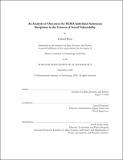An analysis of outcomes for FEMA individual assistance recipients in the context of social vulnerability
Author(s)
Bann, Gabriel(Gabriel T.)
Download1227201492-MIT.pdf (2.241Mb)
Alternative title
Analysis of outcomes for Federal Emergency Management Agency individual assistance recipients in the context of social vulnerability
Other Contributors
Massachusetts Institute of Technology. Institute for Data, Systems, and Society.
Technology and Policy Program.
Advisor
Jarrod Goentzel.
Terms of use
Metadata
Show full item recordAbstract
Natural disasters such as hurricanes, floods, and wildfires have been increasing both in frequency and in the cost of damages. Different communities experience disasters differently, from the immediate losses to the long-term recovery process. Age, disability, race, housing status, and socioeconomic status are factors that can contribute to disparities in a person or community's vulnerability to disasters. Federal disaster aid policy has historically contributed to disaster vulnerability as well, at times enhancing disparities in survivors' ability to respond or recover. The Federal Emergency Management Agency (FEMA) has recently significantly expanded its efforts to individualize the survivor experience, and especially consider the survivor's social vulnerability. We received a large dataset with outcomes for Individual Assistance (IA) programs for registrants in eight different natural disasters from 2008-2017. My research has been to analyze these outcomes in order to explore potential disparities in the survivor experience based on demographic characteristics at the individual and community levels. This document covers my exploration of this data set in the context of social vulnerability. I employ high-level descriptive statistics as well as multi-level modeling techniques to depict the relationship between demographic variables associated with social vulnerability and outcomes in IA programs. Through these modeling techniques, I find that many individual and community-level demographic variables are strongly correlated with FEMA assistance outcomes including assistance amount and the number of contacts between the registrant and FEMA. Finally, I outline significant disparities in assistance levels for different demographic groups.
Description
Thesis: S.M. in Technology and Policy, Massachusetts Institute of Technology, School of Engineering, Institute for Data, Systems, and Society, Technology and Policy Program, September, 2020 Cataloged from student-submitted PDF version of thesis. Includes bibliographical references (pages 57-58).
Date issued
2020Department
Massachusetts Institute of Technology. Institute for Data, Systems, and Society; Technology and Policy Program; Massachusetts Institute of Technology. Engineering Systems DivisionPublisher
Massachusetts Institute of Technology
Keywords
Institute for Data, Systems, and Society., Technology and Policy Program.